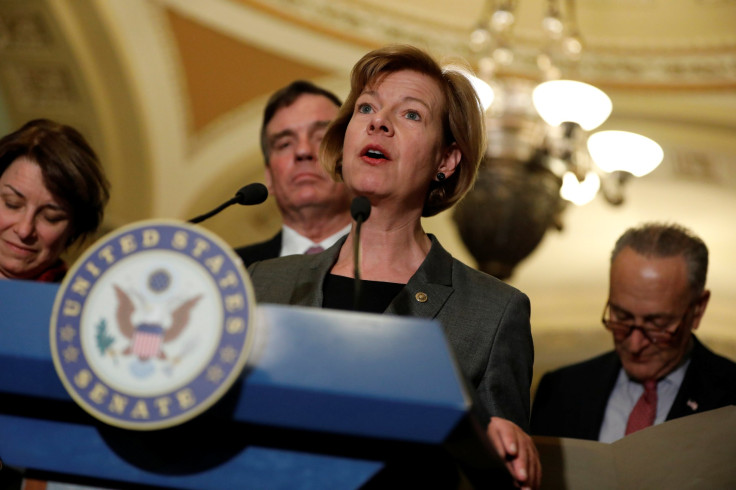Trump Adviser’s Role Makes ‘A Rigged Game Worse,' Democrats Say

Wisconsin Democratic Sen. Tammy Baldwin became the first federal lawmaker to call for Blackstone CEO Stephen Schwarzman to recuse himself from Trump administration policy that affects Schwarzman’s private equity firm. Baldwin’s criticism was echoed by the senior Democrat on the Senate Banking Committee, which oversees many of the economic issues Schwarzman has been working on with the Trump administration. Under fire, the White House began to distance itself from Schwarzman, now arguing that despite Schwarzman chairing the White House Strategic and Policy council, the Blackstone CEO is not working in any official capacity for the White House, and is merely operating his own outside group.
The criticism — and call for recusal — follows an International Business Times report that detailed how Schwarzman is chairing an official White House policy panel overseeing regulatory, energy and infrastructure policies that could enrich Blackstone.
While ethics laws aim to bar government officials from working on issues in which they have a financial interest, Schwarzman is not a White House employee and the Trump administration appears to be interpreting that status to mean he is not subject to the ethics strictures. Baldwin told IBT that Schwarzman should be prevented from working on matters that could involve his firm.
“President Trump said he would drain the swamp, yet time and time again he breaks that promise, granting wealthy Wall Street insiders more access, power and influence in Washington,” said Baldwin in a statement to IBT. “Mr. Schwarzman should submit to federal ethics laws and recuse himself from influencing public policy that enriches his own bank account. The last thing we need in Washington is more billionaires making a rigged game worse.”
Ohio Democrat Sen. Sherrod Brown, who was on Hillary Clinton’s vice presidential short list and has been rumored as a possible challenger to Donald Trump in 2020, also had harsh words for Schwarzman.
“Private individuals have every right to make their views known on public policy issues,” Brown said in a statement to IBT. “But it is flat wrong to give anyone special access and influence to advance their own financial interests rather than the public interest.”
Schwarzman declined to answer IBT’s questions.
Schwarzman is not on the White House payroll, and despite his formal position as the chairman of the President’s Strategic and Policy Forum, and his informal position as Trump’s counselor, he is not subject to federal ethics or conflict-of-interest laws — even as the president considers overhauling the tax code and repealing a variety of financial regulations, actions that would benefit Schwarzman and Wall Street immensely.
Baldwin has repeatedly expressed concern over Wall Street’s influence in the Trump White House. In February, Baldwin and Sen. Elizabeth Warren, D-Mass., sent Goldman Sachs CEO Lloyd Blankfein a letter requesting he disclose any involvement Goldman employees had in drafting two of Trump’s early executive orders.
The senators also asked Blankfein to disclose relevant lobbying efforts and to estimate profits Goldman expected to gain from the orders, which would begin to roll back Dodd-Frank regulations and review the implementation of the fiduciary rule, a Labor Department rule requiring financial advisers act in the best interests of their clients.
“Goldman Sachs would be a major beneficiary of these efforts to deregulate the financial industry; the company’s stock rose by almost 5 percent, increasing your company's market capitalization by $4.1 billion the day of President Trump’s announcement,” the senators wrote.
After taking office, Trump appointed Goldman president Gary Cohn as director of the National Economic Council and picked former Goldman executive Steven Mnuchin to serve as Treasury secretary.
Baldwin also targeted the financial industry in 2015 when she introduced a bill in the Senate that would close the carried interest loophole that allows the government to tax profits given to hedge fund and private equity managers at the 20 percent capital gains rate. Critics say those profits should be taxed as income, which would subject those profits to income tax rates that top out at 39.6 percent. The bill has yet to make it out of committee, much to the relief of Blackstone. The company said in a February SEC filing that the elimination of the loophole would impair “our ability to recruit, retain and motivate our current and future professionals.”
Trump promised to close the carried interest tax loophole on the campaign trail, but has not addressed the issue since moving into the White House. The loophole is just one of the issues that would directly affect Schwarzman’s bottom line. Halting the implementation of the fiduciary rule would also allow money managers to funnel client money to hedge funds like Schwarzman’s. And Schwarzman has been an outspoken critic of Dodd-Frank financial regulations, which Trump has indicated he is committed to dismantling.
© Copyright IBTimes 2024. All rights reserved.






















